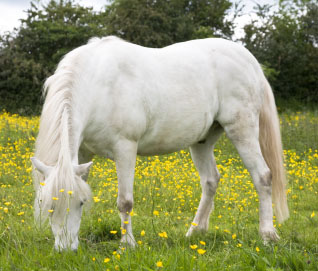 It’s taken a few months, but it looks like we’re finally starting to move
out of the long, long winter and into something a bit friendlier, weather-wise. Your horses are probably
quite happy to have a chance to stretch their legs in the warm sun rather than the cold snow, and most
likely they’re excited to get a chance to eat some rich, spring grass. But hold on a minute! Switching
from winter feed to spring feed isn’t a perfectly simple transition. The sudden change can cause a horse
to feel rather ill, so here’s what you should know what they swap one for the other.
It’s taken a few months, but it looks like we’re finally starting to move
out of the long, long winter and into something a bit friendlier, weather-wise. Your horses are probably
quite happy to have a chance to stretch their legs in the warm sun rather than the cold snow, and most
likely they’re excited to get a chance to eat some rich, spring grass. But hold on a minute! Switching
from winter feed to spring feed isn’t a perfectly simple transition. The sudden change can cause a horse
to feel rather ill, so here’s what you should know what they swap one for the other.
You’re probably thinking this sounds very strange, what with the fact that
horses are basically just eating grass either way, but the truth is, hay eaten during the winter and grass
grown in the spring are actually two different types of food altogether. Spring grass is typically loaded with
carbohydrates, whereas winter hay doesn’t have amount. The sudden shift to a lot of carbs from a little can
indeed upset a horse’s stomach, both by bloating them up fairly quickly and also by messing with their
stomach’s dietary bacteria.
The best way to combat this is to always have the option of fresh grass
available as much as possible, which usually means that you’ll want more than one pasture for your horses. This
will allow one pasture to regrow itself while the other is being grazed on throughout the season. Preferably,
your horse will get a chance to graze even during the colder months, at least a little bit, allowing them to
keep their diet consistent to a certain degree throughout the year.
More realistically though, you’ll probably find yourself looking to
alternative ways of getting some fresh feed to your horse, such as opting to purchase plants that don’t require
any extra care. Think of it as buying your horse a salad, if you will. The downside here is that while
supplementing their diet is great this way, it makes it rather expensive and impractical to make this the core
of their diet.
It’s a good idea both going into spring and coming out of it to transition
your horse slowly between the two by ramping up hay intake near the end of the warm months and increasing the
amount of fresh greens as the heat dies down. Doing so will let your horse’s stomach adjust naturally and give
them the proper nutrition that need normally. Of course, it never hurts to supplement their diet no matter
what, though talk to your veterinarian about the best diet for your particular horse.
Maintaining a horse can be tricky enough without season change, but it doesn’t
have to be an unexpected development. Doing some simple preventative steps can mean the difference between a
happy horse and one with an upset digestive system. Why would you prefer your horse be?
Related Articles
Stable Building Tips
Bedding Pros and Cons
Mucking Out Your Horse's Stall
Feeding Your Horse
What To Feed Your Horse
Giving Up Your Horse
Horse Grooming
Do Horses Need Shoes?
Teeth and Horses
Winterizing Your Barn
Preparing to Travel With Your Horse
Winter Care for Horses
Preventing Barn and Stall Boredom
Tips for Traveling with Your Horse
Stable Requirements: Building
the Space to Meet Your Horses' Needs
Preparing Your Horse for Hot Weather
Tips for Maintaining Your Horse Trailer
Proper Hoof Care
Why Braiding Horse Hair is Beneficial to
Their Health
Tips for Taking Care of an Older Horse
How to Keep Your Horse Fed on a Budget
Transitioning Horses from Winter Feed to
Spring Feed
Why You Should Feed Your Horse Flaxseed
Dealing With an Unhappy Horse in Their
Stall